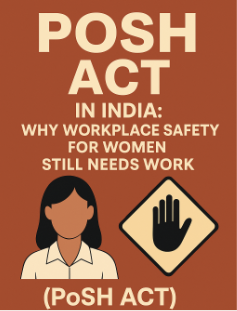Time is changing. In today’s evolving work culture, ensuring a safe and respectful environment for every employee, especially women is not just a legal requirement but a moral imperative. The PoSH Act, 2013 stands as a powerful safeguard, aiming to eliminate inappropriate behavior at the workplace and empower women to speak up without fear.
Why PoSH in News?
Recently, the Supreme Court raised serious concerns over the poor implementation of the PoSH Act. It pointed out that several government departments, educational institutions, and companies had not even set up Internal Complaints Committees, which are mandatory under the Act.
In many workplaces, especially in startups, colleges, and courts, women are still not getting proper support or justice when they face sexual harassment. This has brought the focus back on how the law is working or not working on the ground.
 What is PoSH Full Form?
What is PoSH Full Form?
The full form of PoSH is Prevention of Sexual Harassment. It refers to the Sexual Harassment of Women at Workplace (Prevention, Prohibition and Redressal) Act, 2013. This law was enacted to make Indian workplaces safer and more respectful for women.
When PoSH Act Formed ?
Though the Vishaka Guidelines served as a crucial interim solution, they lacked statutory backing. Recognizing the urgent need for a dedicated law, the government eventually moved to codify these protections into legislation.
Bhanwari Devi incident:
The roots of this Act go back to a horrific incident in 1992. Bhanwari Devi, a social worker in Rajasthan, was gang-raped for trying to stop a child marriage. Her case exposed how there was no legal framework in India to deal with sexual harassment at work.
The Vishaka Guidelines:
In 1997, the Supreme Court responded by issuing the Vishaka Guidelines, which laid down rules to protect women at the workplace. These were based on India’s international commitments like CEDAW (Convention on the Elimination of all Forms of Discrimination Against Women).
The Court drew its guidelines from:
- The Court derived its guidelines from Article 15 of the Indian Constitution, which prohibits discrimination based on religion, race, caste, sex, or place of birth.
- It also referred to international standards, including the General Recommendations under CEDAW.
- India ratified the Convention on the Elimination of All Forms of Discrimination Against Women in 1993.
- The PoSH Bill was introduced by the Ministry of Women and Child Development in 2007.
After undergoing multiple revisions, it was passed by Parliament and came into effect on December 9, 2013. This marked a significant step toward ensuring workplace safety for women.
POSH ACT PROVISION
The Act aims to prevent and punish sexual harassment in any form at the workplace. Some of its features are:
- Covers all women whether regular, temporary, contractual, interns, or visiting workers.
- Applies to all workplaces, private companies, government offices, NGOs, educational institutions, etc.
- Defines sexual harassment broadly to include:
- Unwelcome physical contact
- Sexually coloured remarks
- Showing pornography
- Making sexual advances
- Verbal or non-verbal conduct of a sexual nature
Five Instances of Sexual Harassment:
- Any implied or direct promise of job-related benefits in exchange for sexual favours.
- Threats explicit or implied of negative consequences in employment.
- Threats concerning current or future employment status.
- Disruption of work through a hostile, offensive, or intimidating atmosphere.
- Humiliating conduct that could endanger physical or mental well-being.
Who is Covered as an Employee:
The law protects all women whether full-time, part-time, contract-based, interns, trainees, or daily wagers regardless of employment terms.
Wider Definition of Workplace:
The term ‘workplace’ includes all sectors and formats, from conventional offices to remote work setups and any location visited for professional purposes.
Internal Complaints Committee and Local Committee
These are the bodies that handle complaints of harassment.
Internal Complaints Committee (ICC)
- Formed by every organization with 10+ staff.
- Should include:
- A senior woman employee as Presiding Officer
- At least two employees
- One external member from an NGO or with legal experience
Local Committee (LC)
- Formed by the District Officer
- Handles complaints from:
- Workplaces with less than 10 employees
- Women who work in informal sectors (e.g., domestic workers, gig workers)
- Cases where the accused is the employer or owner
ROLE OF Internal Complaints Committee and Local Committee
- Receive complaints and conduct fair inquiries
- Maintain the privacy of all parties involved
- Recommend disciplinary action or compensation
- Help the complainant file an FIR, if needed
- Submit annual reports to authorities for accountability
Duties of Employer
The Act puts clear responsibilities on the employer, such as:
- Establish an Internal Complaints Committee (ICC) and provide proper training to its members.
- Organize regular awareness sessions to educate employees about sexual harassment and their rights.
- Clearly display anti-harassment policies and consequences at prominent spots within the workplace.
- Offer emotional and legal support to the aggrieved individual throughout the redressal process.
Maintain a workplace culture that prioritizes safety, dignity, and inclusivity for all employees. - Submitting annual compliance reports.
- If an employer fails to set up an Internal Complaints Committee (ICC) or violates any provision of the PoSH Act, they may be fined up to ₹50,000.
- For repeated non-compliance, the penalty can increase, and the employer may also face cancellation of license or registration.
POSH ACT Challenges in Implementation
Challenges in Implementing the PoSH Act
- Limited Access for Informal Sector Workers:
Over 80% of women in India work in the informal sector, where the law’s mechanisms are often out of reach or poorly enforced.
- Widespread Underreporting:
Fear of losing jobs, organizational power imbalance, and the difficulty of producing solid evidence discourage many women from filing complaints.
- Failure to Constitute ICCs:
Many organizations, including national sports federations, have failed to establish Internal Complaints Committees as mandated by the law.
- Improper Formation of ICCs:
Some ICCs are either understaffed or missing the required external member, weakening the fairness and neutrality of the redressal process.
- Lack of Procedural Clarity and Awareness:
Ambiguities in conducting inquiries and a general lack of awareness among women employees about where and how to file complaints further hinder effective implementation.
POSH ACT Implementation Hurdles Reason
- Reasons behind these Hurdles:
- Patriarchal mindset in many workplaces
- Lack of political will and regular monitoring
- Absence of Centralized Monitoring
- Lack of Clear Accountability
- Fear of bad publicity leads to cover-ups
- Very few penalties for not following the law
- Power imbalances between the victim and accused discourage justice
- Confusion or delay in legal processes frustrates complainants
Conclusion
The PoSH Act is a landmark law, but it can’t work unless it is taken seriously by employers, enforced strongly by authorities, and supported socially. Creating safe workspaces is not just a legal responsibility, it’s a moral one.
More awareness, proper training, and strict accountability are the need of the hour. Only then can workplaces become truly respectful and equal for all.
PoSH Full Form FAQs
What is PoSH Full Form?
PoSH Full Form is Prevention of Sexual Harassment.It refers to safety laws for women at the workplace.
What is the full form of PoSH Act?
PoSH Act means Prevention of Sexual Harassment of Women at Workplace Act, 2013.
It protects women from sexual harassment at work.
Why was the PoSH Act created?
The Act was made to stop sexual harassment at workplaces. It ensures women feel safe and respected at work.
Who is protected under the PoSH Act?
All working women full-time, part-time, interns, and contract workers. Even domestic and gig workers are included.
What happens if a company doesn’t follow the PoSH Act?
The company can be fined up to ₹50,000. Repeated violations may lead to cancellation of license.
What is PoSH Full Form?
PoSH Full Form is Prevention of Sexual Harassment.It refers to safety laws for women at the workplace.
What is the full form of PoSH Act?
PoSH Act means Prevention of Sexual Harassment of Women at Workplace Act, 2013.
It protects women from sexual harassment at work.
Why was the PoSH Act created?
The Act was made to stop sexual harassment at workplaces. It ensures women feel safe and respected at work.
Who is protected under the PoSH Act?
All working women full-time, part-time, interns, and contract workers. Even domestic and gig workers are included.
What happens if a company doesn’t follow the PoSH Act?
The company can be fined up to ₹50,000. Repeated violations may lead to cancellation of license.















